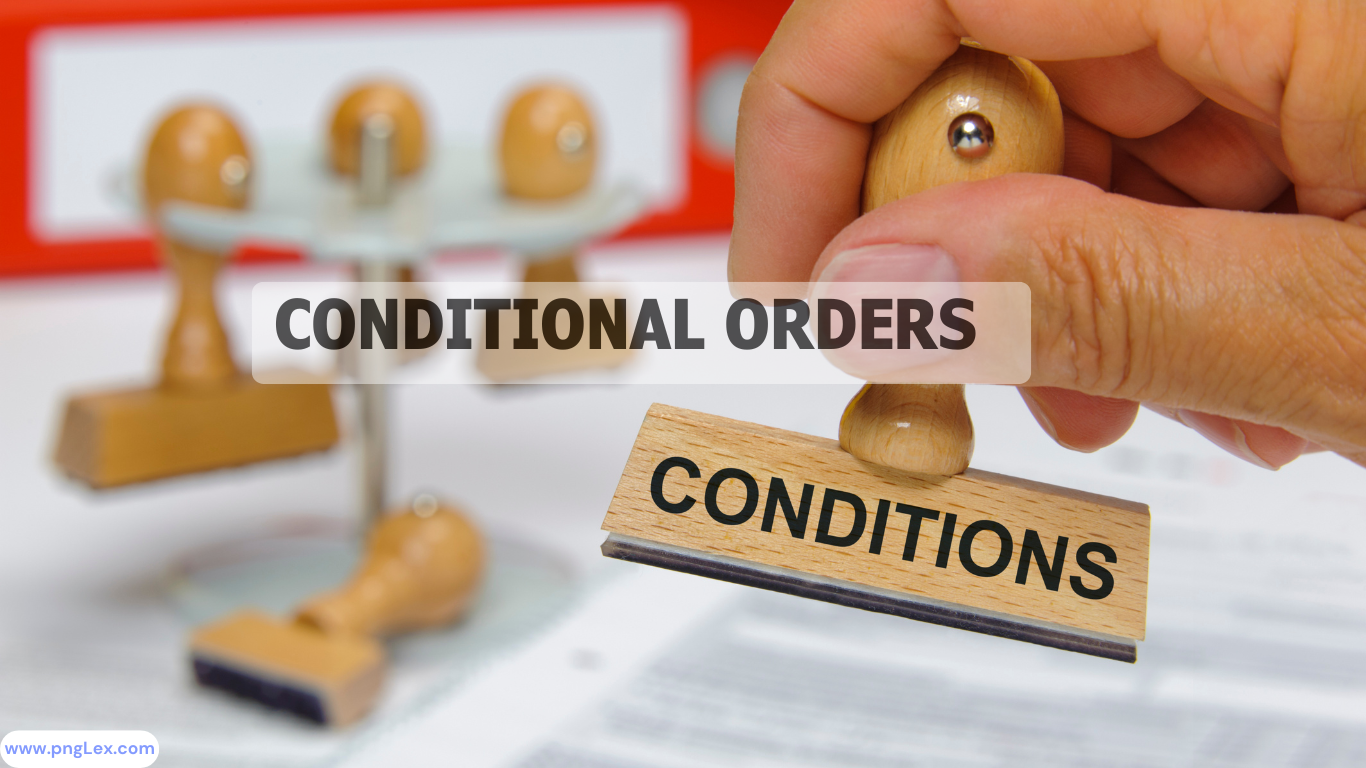What are self-executing orders or conditional orders?
The principles governing conditional or self-executing orders have been settled in our jurisdiction. In Baing v PNG National Stevedores Pty Limited [2000] PGSC 1; SC627 (Sheehan Sawong Kirriwom JJ), the Court answered the question of what is a conditional order? An order is conditional if the terms of the order are conditional upon the happening of some event in the future. This means that parties to the proceeding must return to Court again for the Court to determine whether the event did occur or was there an act of non-compliance of the order by the parties required to the do the act.
The Court then relied on the Australian case of FAI General Insurance Co Ltd v Southern Cross Exploration [1988] HCA 13; [1988] 165 CLR 268 where the High Court of Australia considered, inter alia, the meaning and effect of conditional orders. Gaudron J at 289, said:
“A conditional order, of its nature, necessitates the exercise of the further judicial function of determining that the condition was not satisfied at the specified time”.
It is, therefore, clear that a conditional order by its very nature requires further judicial function of determining that the condition was not satisfied at the specified time.
Is a conditional order a final order?
The short answer is no, it is not a final order. Justice Kandakasi ( as he then was) clearly explained this in ToRobert v ToRobert [2004] PGNC 43; N2744 wherein his Honour followed the ruling in Baing v PNG National Stevedores Pty Limited [supra].
“The clear impression I gather from these authorities is that, self-executing or conditional orders are not final orders in themselves. Instead, they are a forewarning of what would happen if a party required to take certain actions or steps specified in such orders fails to take them within the time limits stipulated by such orders. Such orders are therefore, not an end in themselves but rather set conditions precedent for the entry of the order or judgment forewarned in these kinds of orders on the fulfilment of the condition specified in the order. Then where there is a satisfaction of the stipulated conditions, it entitles the party seeking its benefit to go back to the Court and demonstrate the satisfaction of the condition and there being no impediment to the grant of the orders or judgment already forewarned.
What does “further judicial function” entail?
Justice Kandakasi (as he then was) in ToRobert v ToRobert [2004] PGNC 43; N2744 discussed in detail what the Supreme Court meant by stating that further judicial function is required.
“That function is to determine a satisfaction or not of the condition stipulated in the self-executing or conditional order. If the exercise of that judicial function results in a determination in terms of a satisfaction of the conditions, the Court would then make the orders or enter the kind of judgment or orders forewarned. It follows clearly therefore that; there is no automatic coming into effect or issuance of the forewarned orders or judgment on the expiry of the set deadline. Given that, it appears clear to me that, it is a misnomer to describe the kind of orders under consideration as “self-executing” or “conditional orders.” They should instead be described as “condition imposing orders”.
How to invoke the Court’s further judicial function?
If a party to the proceeding alleges that the other party, to whom the Court directed the term of the conditional order, did not comply with the order, then that party must file a notice of motion. The motion must seek that judgement be entered against the defaulting party. That motion must be supported by an affidavit setting out the non-compliance of the defaulting party.
This will allow both or all parties to the proceeding have the opportunity to be heard before the Court makes a final decision on the satisfaction of the stipulated conditions and the consequence that should follow from a determination of that question. This is important because it might end a defaulting party’s claim or may mean judgment against the defaulting party. Hence, the Court must observe the principles of natural justice adopted and guaranteed under Section 59 of the Constitution by giving all parties the opportunity to be heard.
Other relevant cases
Read these cases for more insight on this topic:
- Baing v PNG National Stevedores Pty Limited [2000] PGSC 1; SC627
- ToRobert v ToRobert [2004] PGNC 43; N2744
- Nukumal Plantation Ltd v Tukake Ltd [2005] PGNC 164; N2781
For more similar articles, click here.





About the author